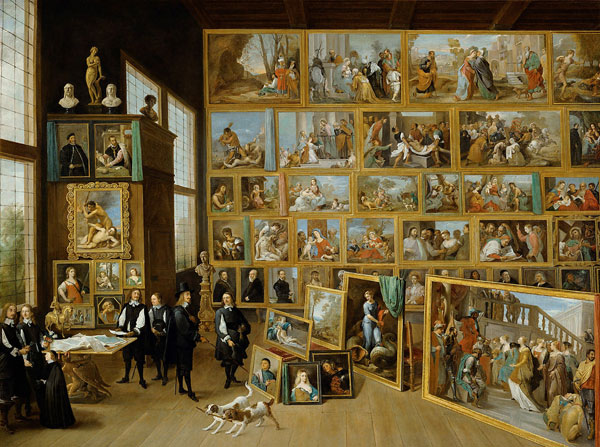
David Teniers the Younger Duke Leopold Wilhelm in his [own] gallery in Brussels (ca. 1651)
We've been through this thing before, and it doesn't go down easier the second time: Another Greek tycoon has rented (at no charge) the museum of which he is a trustee, in order to showcase his expensive art hoard.
Fifteen months ago I was the first to complain about the New Museum's judgment and ethics when it announced that it would be hosting "Skin Fruit", a show of work owned by Dakis Joannou.
I don't think I'm the first to complain this time*, since the news was reported by New York Times' Carol Vogel (once again the messenger, as she was for NuMU's plans) a week ago. That article reports the basic facts, that in the coming spring the Guggenheim Bilbao will be hosting "The Luminous Interval", a show of work owned by Dimitris Daskalopoulos, Unlike the article she wrote in 2009, this one asks questions, or rather it appears that the museum itself anticipated questions, defending its decision and arranging for their friendly big-deal collector to be available for a statement.
I'm not satisfied with the answers. While there may be no law against it, the ethical problems are obvious: installing a private collection exhibition in a public museum is just wrong, unless ownership of the work has already been transferred to the museum.
Museum directors should know this.
I know I may sound like a scold, but when it comes to the art world I really don't normally go out of my way to look for things to criticize. My experience of the last year or so has saddened me however, as I watch our museums making some very bad decisions. I'd rather be looking at art, or listening to or watching a performance, but it seems to me that museums are "acting up" (and not in the good way) a lot these days.
Maybe it's because of the ubiquity and curiousity of the internet that so many ethical missteps are being exposed within institutions we really cherish. Perhaps we're just more impatient with custom or superciliousness then we once were. It's even possible we've given up believing we can influence government behavior and so look to our own neighborhoods, our own family. Whatever it is, it's not easy to ignore these institutional failings, or the cant which tries to disguise them.
We have the right to expect better of the people who guard our heritage and our sacred spaces. Philip Kennicott, in his excellent Washington Post commentary on "Hide/Seek", published yesterday, describes the extraordinary importance of the museum to people who do not worship in a church, temple, mosque, or forest:
"The museum has become a quasi-sacred space, with rules as complicated and inviolate as any church liturgy. People who don't find the meaning of their existence in churches are often passionate about museums, where a set of fundamental values - openness, fearlessness, truthfulness - are celebrated with all the historical trappings.
ADDENDUM: Whoa! ARTINFO had the story two months ago. I'm sorry I missed both their scoop, and their complaint about how the Guggenheim stonewalled them:
When preparing the original scoop, "IN THE AIR" [an ARTINFO blog] contacted the Guggenheim for comment, which the museum declined to provide - relegating the news to "rumor" status despite multiple well-placed sources confirming the story, and the now-evident accuracy of its substance.
[image from Wikipedia]